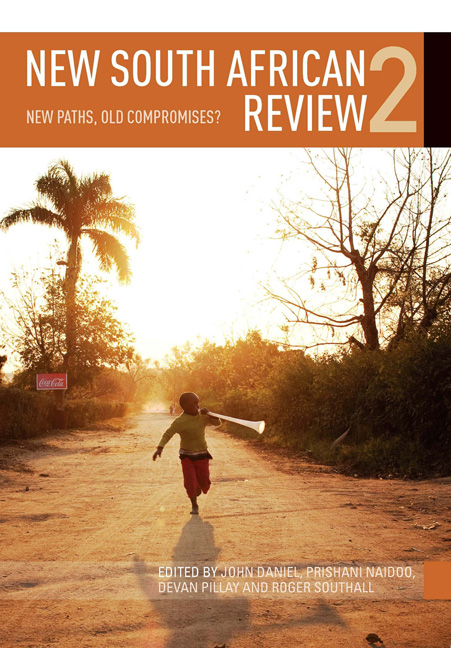Book contents
- Frontmatter
- Contents
- Preface
- Introduction: New paths, old (com)promises?
- PART 1 POLITICS AND INTERNATIONAL
- PART 2 ECONOMY AND SOCIETY
- PART 3 ENVIRONMENT
- PART 4 MEDIA
- Introduction: Media transformation and the right to know
- Chapter 17 The print media transformation dilemma
- Chapter 18 The South African Broadcasting Corporation: The creation and loss of a citizenship vision and the possibilities for building a new one
- Contributors
- Index
Chapter 18 - The South African Broadcasting Corporation: The creation and loss of a citizenship vision and the possibilities for building a new one
from PART 4 - MEDIA
Published online by Cambridge University Press: 23 March 2018
- Frontmatter
- Contents
- Preface
- Introduction: New paths, old (com)promises?
- PART 1 POLITICS AND INTERNATIONAL
- PART 2 ECONOMY AND SOCIETY
- PART 3 ENVIRONMENT
- PART 4 MEDIA
- Introduction: Media transformation and the right to know
- Chapter 17 The print media transformation dilemma
- Chapter 18 The South African Broadcasting Corporation: The creation and loss of a citizenship vision and the possibilities for building a new one
- Contributors
- Index
Summary
INTRODUCTION
The SABC is the largest news operation in the country – nearly twenty million of the twenty-nine million radio listeners in South Africa tune into one of the SABC's eighteen radio stations, and the SABC's three free-to-air television channels attract more than seventeen million adult viewers each day (Open Society Institute, 2010: 125). But beyond its size and reach the SABC is important because it is the nation's public broadcaster – and as a public broadcaster it offers citizens the possibility of distinctive, reflective, quality programming, independent of major vested interests, be they government or commercial. It offers the possibility of programming specifically targeted at the deepening of citizenship and the strengthening of democracy.
For a brief moment after 1994 there was a burst of creativity at the SABC and a palpable excitement about public broadcasting and its development, information and entertainment possibilities (Du Preez, 2003; Open Society Institute, 2010). Veteran journalist Max du Preez (2003: 253) argues that, ‘In 1994, it [the SABC] had the potential to be the prime agent for positive change in the new democracy’. Sadly, however, the SABC was soon dogged by crises. Since late 2007, the corporation has experienced almost perpetual governance and financial challenges. These have included problems with successive boards and CEOs and ongoing problems with the SABC's oversight structures, including the Ministry and Department of Communications, parliament and South Africa's independent regulator, the Independent Communications Authority of South Africa (Icasa).
This chapter seeks to track the reasons behind the myriad problems facing the SABC, particularly since late 2007, and seeks to put forward a number of (tentative) solutions to these challenges. The proposals outlined have been debated by independent producers, unions, NGOs, students and academics. Collectively, solutions have been debated by the civil society coalition originally known as the ‘Save our SABC’ campaign and then later the ‘SOS: Support Public Broadcasting Coalition’. The chapter will critically examine the coalition's and broader civil society's proposals, from an insider's perspective.
- Type
- Chapter
- Information
- New South African Review 2New paths, old compromises?, pp. 369 - 386Publisher: Wits University PressPrint publication year: 2012



